中考英语复习课件: 特殊句式和主谓一致 (共48张PPT)
文档属性
| 名称 | 中考英语复习课件: 特殊句式和主谓一致 (共48张PPT) |

|
|
| 格式 | zip | ||
| 文件大小 | 734.8KB | ||
| 资源类型 | 教案 | ||
| 版本资源 | 通用版 | ||
| 科目 | 英语 | ||
| 更新时间 | 2018-11-04 00:00:00 | ||
图片预览

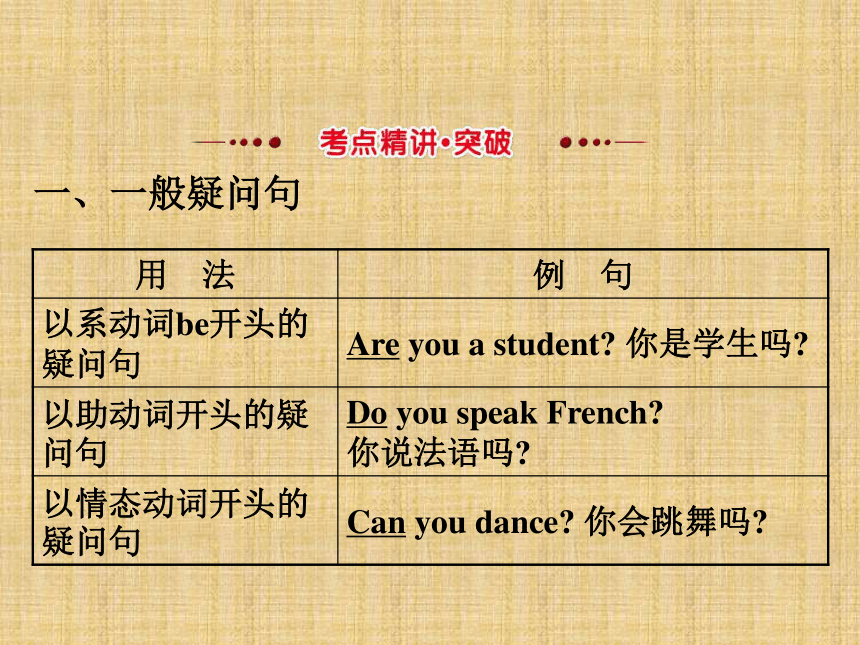
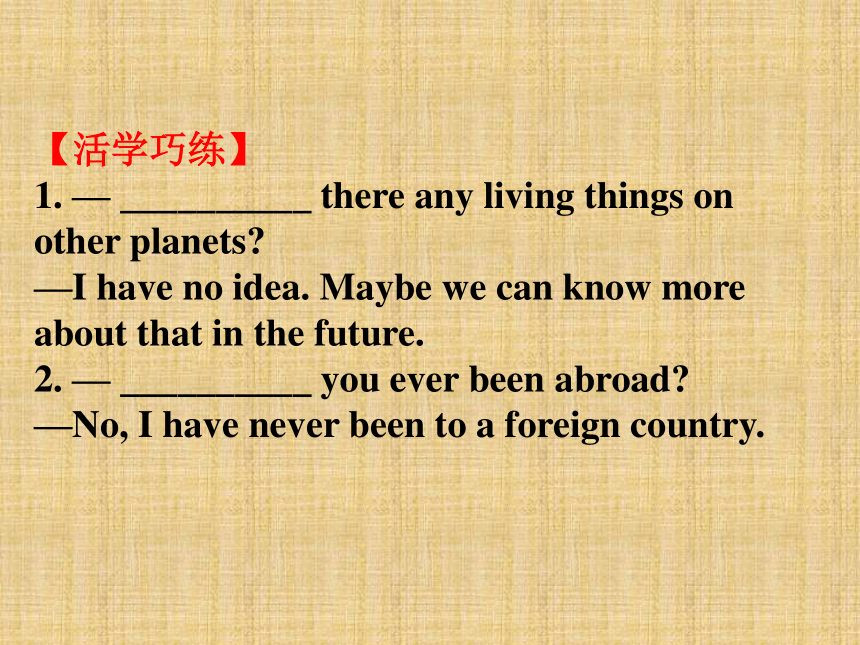
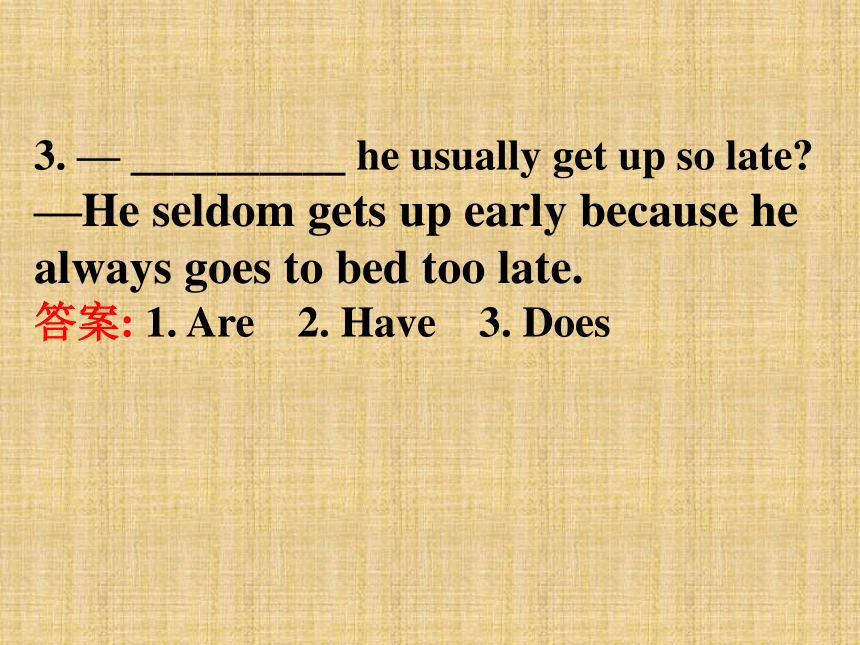
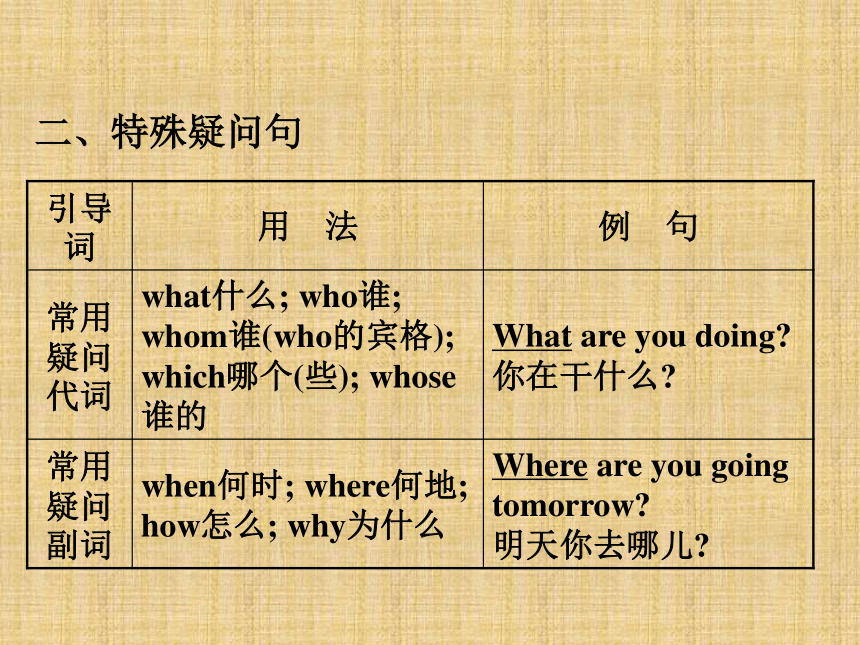
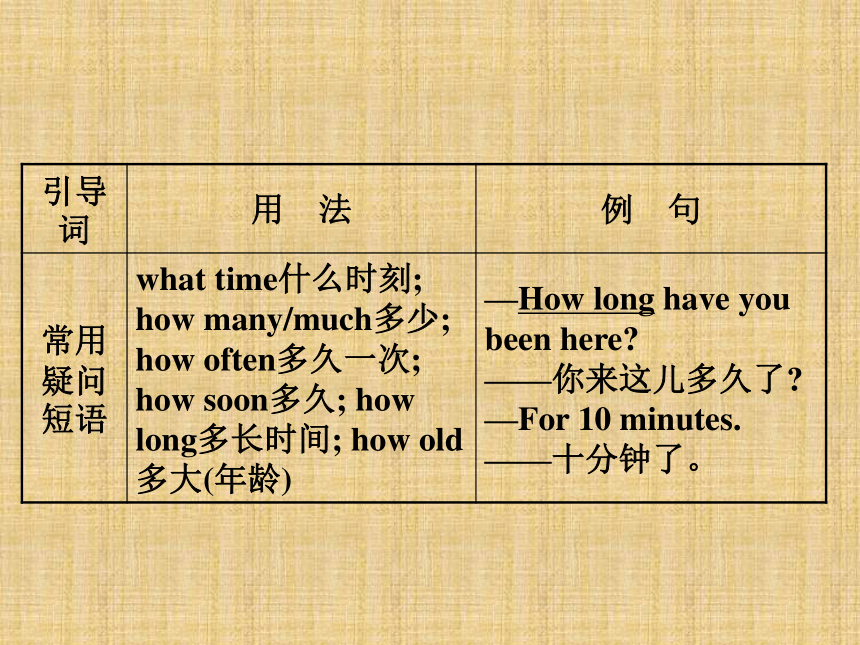
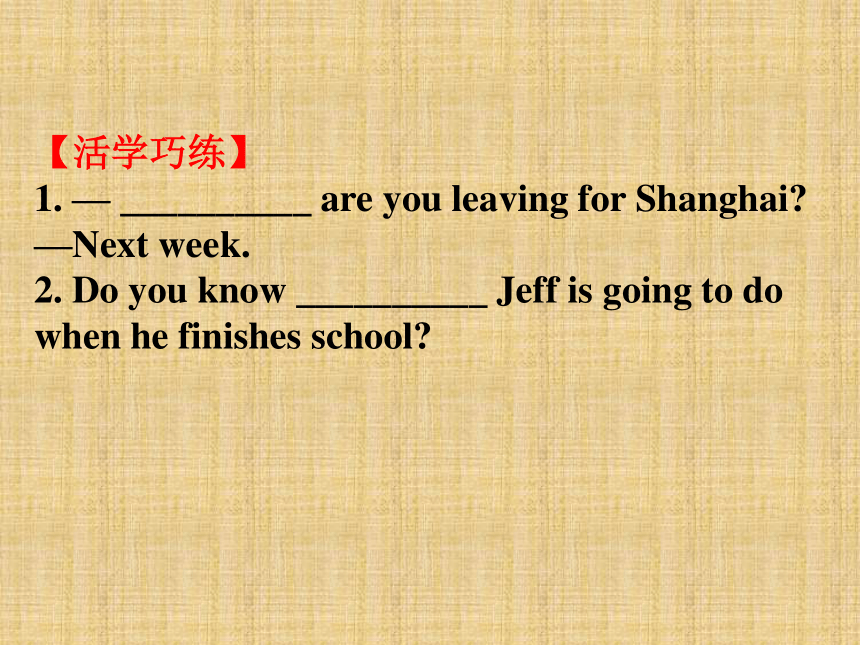
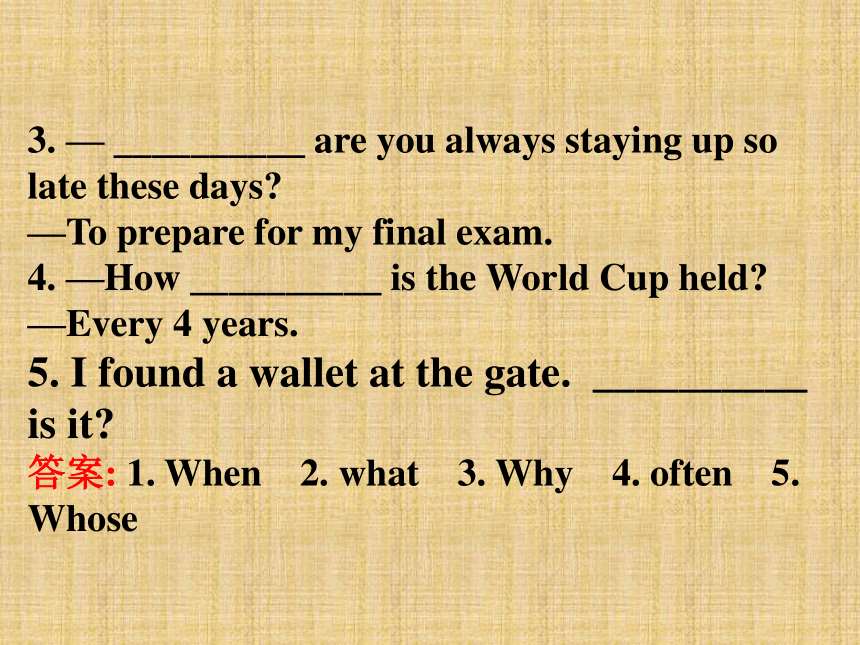
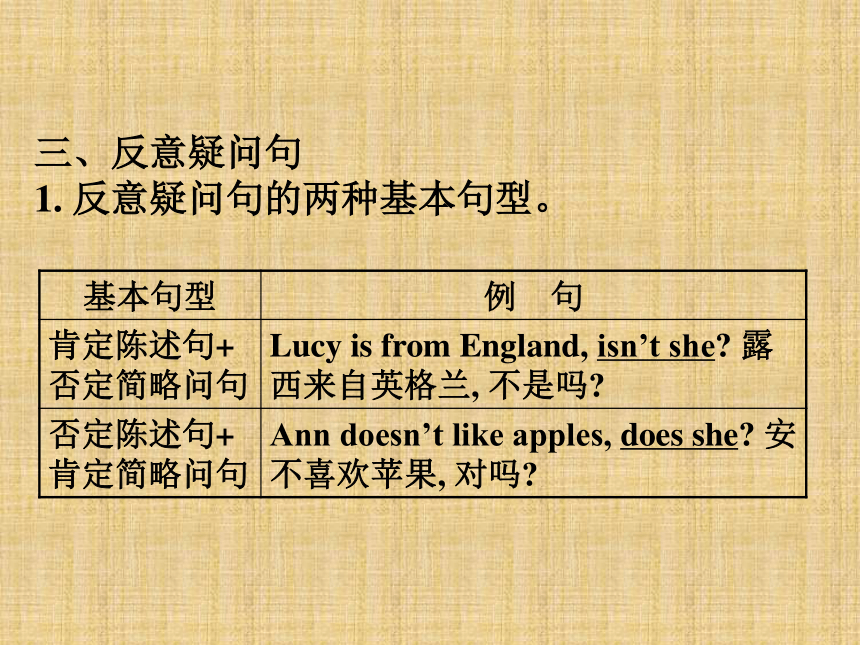
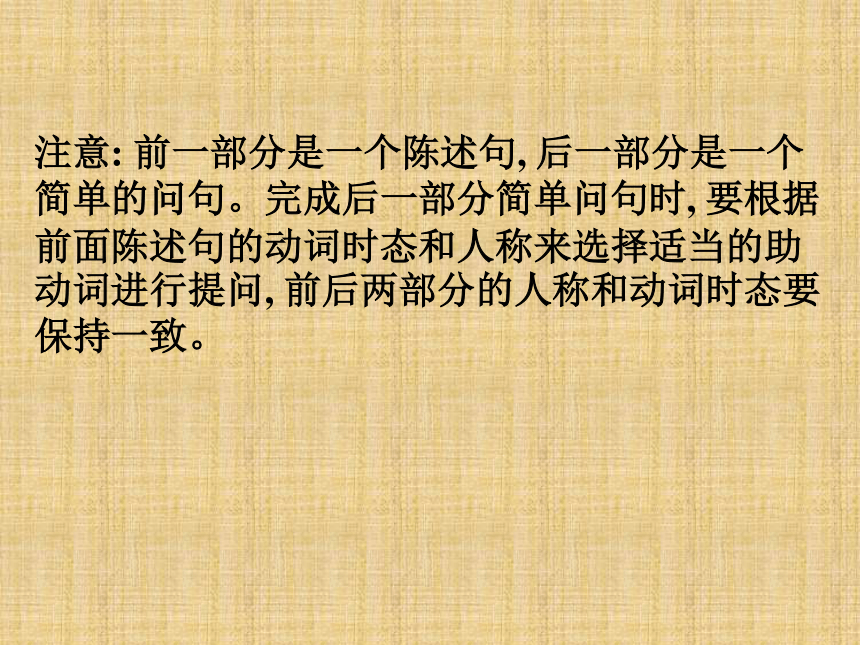
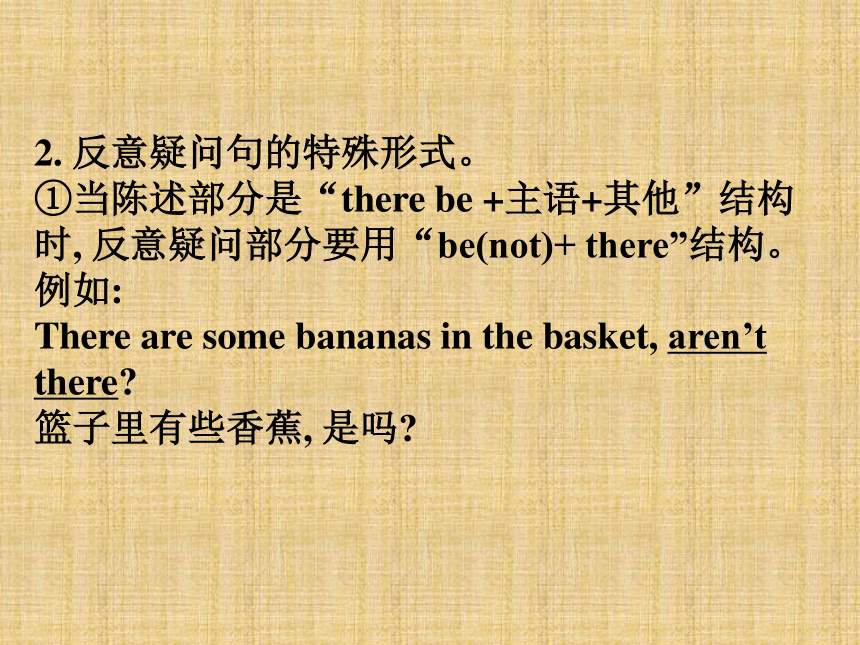
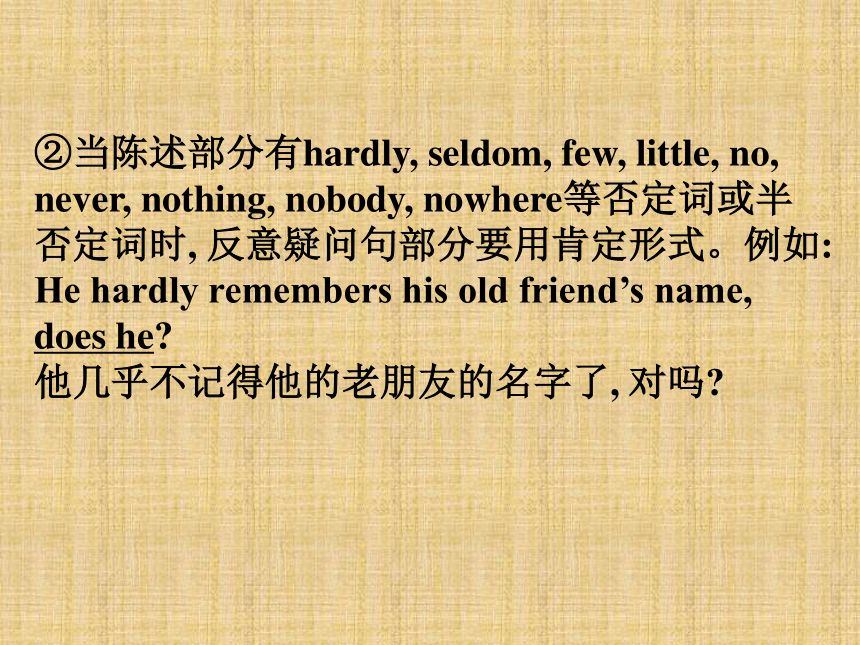
文档简介
课件47张PPT。专题十二
特殊句式和主谓一致一、一般疑问句【活学巧练】
1. — __________ there any living things on other planets?
—I have no idea. Maybe we can know more about that in the future.
2. — __________ you ever been abroad?
—No, I have never been to a foreign country. 3. — __________ he usually get up so late?
—He seldom gets up early because he always goes to bed too late.
答案: 1. Are 2. Have 3. Does二、特殊疑问句【活学巧练】
1. — __________ are you leaving for Shanghai?
—Next week.
2. Do you know __________ Jeff is going to do when he finishes school? 3. — __________ are you always staying up so late these days?
—To prepare for my final exam.
4. —How __________ is the World Cup held?
—Every 4 years.
5. I found a wallet at the gate. __________ is it?
答案: 1. When 2. what 3. Why 4. often 5. Whose三、反意疑问句
1. 反意疑问句的两种基本句型。注意: 前一部分是一个陈述句, 后一部分是一个简单的问句。完成后一部分简单问句时, 要根据前面陈述句的动词时态和人称来选择适当的助动词进行提问, 前后两部分的人称和动词时态要保持一致。2. 反意疑问句的特殊形式。
①当陈述部分是“there be +主语+其他”结构时, 反意疑问部分要用“be(not)+ there”结构。例如:
There are some bananas in the basket, aren’t there?
篮子里有些香蕉, 是吗? ②当陈述部分有hardly, seldom, few, little, no, never, nothing, nobody, nowhere等否定词或半否定词时, 反意疑问句部分要用肯定形式。例如:
He hardly remembers his old friend’s name, does he?
他几乎不记得他的老朋友的名字了, 对吗? ③肯定祈使句的反意疑问部分用will you或won’t you皆可。否定祈使句的反意疑问句部分用will you。例如:
Be sure to write to us, will you/won’t you?
一定要给我们写信, 好吗(不好吗)?
Don’t smoke in the meeting room, will you?
请不要在会议室吸烟, 好吗? ④在宾语从句中, 如果陈述句部分是“I think(believe, suppose, imagine, expect等)+宾语从句”, 反意疑问句部分应与宾语从句的主谓保持一致, 并要注意否定转移。(简而言之: 反从不反主)例如:
I don’t think you have heard of him before, have you?
我认为你以前没有听说过他, 是吗? 【活学巧练】
1. —Don’t be late for school next time, __________ you?
—No, I won’t.
2. We have to finish the work now, __________ we?
3. Nancy, sweep the classroom, __________ you? 4. —It’s Father’s Day today, __________ it?
—Yes, let’s buy a gift for Dad.
5. I hear the tall girl wearing glasses is your new classmate. She’s from America, __________ she?
答案: 1. will 2. don’t 3. will 4. isn’t 5. isn’t四、感叹句【巧学妙记】
感叹句, 并不难, what或how摆在前。
强调名词用what, 其余how很简单。
名词若是可数单, 前带冠词a或an。
主语谓语放在后, 省略也是很常见。【活学巧练】
1. —Listen! Someone is playing the piano.
—Wow! __________ beautiful music! I like it very much.
2. — __________ a nice day today!
—Yeah, let’s take a walk outside. 3. __________ important it is for kids to imagine freely!
4. __________ a beautiful skirt it is!
5. —Wow! __________ cold it is today!
—Yes. I’m afraid it will be colder tomorrow.
答案: 1. What 2. What 3. How 4. What 5. How五、祈使句
1. 肯定形式的祈使句。2. 否定形式的祈使句。
(1)Do型和Be型的否定式都是在句首加don’t构成。例如:
①Don’t forget me! 不要忘记我!
②Don’t be late for school! 上学不要迟到! (2)Let型的否定式有两种: “Don’t +let+宾语+动词原形+其他成分”和“Let+宾语+not+动词原形+其他成分”。例如:
Don’t let him go. /Let him not go. 别让他走。
(3)有些可用no开头, 用来表示禁止性的祈使句。例如:
No smoking! 禁止吸烟! 【活学巧练】
1. Daniel, __________ play with the mobile phone while you’re walking in the street.
2. __________ (not, walk)on the grass, or it will“cry”.
3. __________ (be)kind and helpful to the people around us, and we will make the world a nicer place to live in. 4. Please __________ (go)over your exam papers once again before handing them in.
5. __________ (not, forget)to give my dog some food and change her water while I am away.
答案: 1. don’t 2. Don’t walk 3. Be 4. go 5. Don’t forget六、语法一致
1. 语法一致原则, 就是句子的谓语动词同句子的主语在语法形式上保持一致, 即主语是第三人称单数或不可数名词时, 谓语动词也用第三人称单数形式; 当主语是第一、第二、第三人称复数形式时, 谓语动词也用复数形式。
Tom is an English boy. 汤姆是一个英国男孩。2. 语法一致原则的其他用法。
(1)用and或both. . . and. . . 连接的名词作主语时, 谓语动词用复数形式。
Tom and Mike are good friends. 汤姆和迈克是好朋友。(2)不定代词something, somebody, someone, everything, everybody, everyone, anything, anybody, anyone, nothing, nobody, no one, either, neither等作主语时, 谓语动词用单数形式。
Is there anything wrong with your car?
你的汽车有毛病吗? (3)由every. . . , every. . . and. . . , each. . . , each. . . and. . . 作主语时, 谓语动词用单数形式。
Every boy and every girl was given a new book.
每个男孩和女孩都收到了一本新书。 (4)由with, together with, as well as等词连接并列主语时, 谓语动词的数和前面的主语保持一致。
Tom with his good friends is going to Beijing next week.
汤姆和他的好朋友下周将去北京。(5)lots of. . . , plenty of. . . , 分数或百分数+名词作主语时, 其谓语动词的形式取决于其后面的名词。如果是单数名词或不可数名词, 谓语动词用单数形式; 如果名词是复数形式, 则谓语动词用复数形式。
Three fifths of the students are boys.
五分之三的学生是男孩。 (6)由cup, bottle, pair等计量单位名词修饰的名词充当主语时, 谓语动词用单数还是复数形式由计量单位名词的单复数形式决定。
Fifteen pairs of shoes are made by him every day.
他每天做十五双鞋子。(7)某些复数形式的名词(如clothes, pants, shorts, shoes, gloves. . . )作主语时, 谓语动词用复数形式。
My shoes are worn out. 我的鞋子穿坏了。
(8)动词不定式、动名词或句子作主语时谓语动词用单数形式。
Reading is learning. 读书就是学习。
What he said is true. 他说的话是真的。 【活学巧练】
1. Every day, too much water __________ (be)wasted in our school. We should save it.
2. Everyone in our class __________ (encourage)to take part in the English Speech Contest. 3. Mary with her parents often __________ (go)for a walk in the park after supper.
4. Everybody except Mike and Linda __________ (be)there when the meeting began. 5. —How many women doctors are there in your hospital?
—The number of them __________ (be)over twenty.
答案: 1. is 2. is encouraged 3. goes 4. was 5. is七、意义一致
1. 意义一致又叫概念一致, 即谓语是单数还是复数要看主语所表达的概念。
My family is a big one with ten people.
我的家庭是一个有十口人的大家庭。2. 意义一致原则的具体用法。
(1)表示金钱、时间、价格或度量衡的复合名词作主语时, 通常把这些名词看作一个整体, 谓语一般用单数形式。
Ten years is a long time. 十年是一段很长的时间。(2)family, class, group, team和crowd等集体名词作主语时, 如果表示整体概念, 谓语动词用单数形式: 如果表示集体中的成员, 谓语动词用复数形式。
My class is very good. 我们班非常好。
My family all like playing basketball.
我们全家人都喜欢打篮球。 (3)“the+形容词”作主语。
“the+形容词”作主语时如果指一类人, 谓语动词用复数形式, 如果指抽象的概念其谓语动词用单数。
The old in our town are taken good care of.
我们镇里的老人被照顾得非常好。【活学巧练】
1. —Mom, I watched TV for only forty minutes. Sometimes watching TV is good for us.
—Forty minutes __________ (be)enough. Now you must do your homework.
2. Three million __________ (be)a large number. You can make it smaller. 3. Two fifths of the students in our class __________ (be)girls.
答案: 1. is 2. is 3. are八、就近一致
1. 就近一致原则又叫邻近原则, 即谓语是单数还是复数要与最靠近它的主语保持一致。
Either you or he is right. 要么你对, 要么他对。2. 就近一致原则的具体用法。
(1)由either. . . or, neither. . . nor, not only. . . but also. . . 连接两个并列主语时, 句子的谓语和较近的主语保持一致。
Neither Tom nor I am from Japan.
汤姆和我都不是来自日本。(2)there(here)be结构中的谓语常与最近的主语保持一致。
There is a desk and ten chairs in the room.
在这个房间里有一张桌子和十把椅子。【活学巧练】
1. —What would you like to have for supper?
—Either noodles or rice ________ OK. I don’t mind.
2. Neither Tony nor I __________ (be)interested in playing Weibo.
3. Not only I but also Tom __________ (be)interested in English because it is useful.
答案: 1. is 2. am 3. is
特殊句式和主谓一致一、一般疑问句【活学巧练】
1. — __________ there any living things on other planets?
—I have no idea. Maybe we can know more about that in the future.
2. — __________ you ever been abroad?
—No, I have never been to a foreign country. 3. — __________ he usually get up so late?
—He seldom gets up early because he always goes to bed too late.
答案: 1. Are 2. Have 3. Does二、特殊疑问句【活学巧练】
1. — __________ are you leaving for Shanghai?
—Next week.
2. Do you know __________ Jeff is going to do when he finishes school? 3. — __________ are you always staying up so late these days?
—To prepare for my final exam.
4. —How __________ is the World Cup held?
—Every 4 years.
5. I found a wallet at the gate. __________ is it?
答案: 1. When 2. what 3. Why 4. often 5. Whose三、反意疑问句
1. 反意疑问句的两种基本句型。注意: 前一部分是一个陈述句, 后一部分是一个简单的问句。完成后一部分简单问句时, 要根据前面陈述句的动词时态和人称来选择适当的助动词进行提问, 前后两部分的人称和动词时态要保持一致。2. 反意疑问句的特殊形式。
①当陈述部分是“there be +主语+其他”结构时, 反意疑问部分要用“be(not)+ there”结构。例如:
There are some bananas in the basket, aren’t there?
篮子里有些香蕉, 是吗? ②当陈述部分有hardly, seldom, few, little, no, never, nothing, nobody, nowhere等否定词或半否定词时, 反意疑问句部分要用肯定形式。例如:
He hardly remembers his old friend’s name, does he?
他几乎不记得他的老朋友的名字了, 对吗? ③肯定祈使句的反意疑问部分用will you或won’t you皆可。否定祈使句的反意疑问句部分用will you。例如:
Be sure to write to us, will you/won’t you?
一定要给我们写信, 好吗(不好吗)?
Don’t smoke in the meeting room, will you?
请不要在会议室吸烟, 好吗? ④在宾语从句中, 如果陈述句部分是“I think(believe, suppose, imagine, expect等)+宾语从句”, 反意疑问句部分应与宾语从句的主谓保持一致, 并要注意否定转移。(简而言之: 反从不反主)例如:
I don’t think you have heard of him before, have you?
我认为你以前没有听说过他, 是吗? 【活学巧练】
1. —Don’t be late for school next time, __________ you?
—No, I won’t.
2. We have to finish the work now, __________ we?
3. Nancy, sweep the classroom, __________ you? 4. —It’s Father’s Day today, __________ it?
—Yes, let’s buy a gift for Dad.
5. I hear the tall girl wearing glasses is your new classmate. She’s from America, __________ she?
答案: 1. will 2. don’t 3. will 4. isn’t 5. isn’t四、感叹句【巧学妙记】
感叹句, 并不难, what或how摆在前。
强调名词用what, 其余how很简单。
名词若是可数单, 前带冠词a或an。
主语谓语放在后, 省略也是很常见。【活学巧练】
1. —Listen! Someone is playing the piano.
—Wow! __________ beautiful music! I like it very much.
2. — __________ a nice day today!
—Yeah, let’s take a walk outside. 3. __________ important it is for kids to imagine freely!
4. __________ a beautiful skirt it is!
5. —Wow! __________ cold it is today!
—Yes. I’m afraid it will be colder tomorrow.
答案: 1. What 2. What 3. How 4. What 5. How五、祈使句
1. 肯定形式的祈使句。2. 否定形式的祈使句。
(1)Do型和Be型的否定式都是在句首加don’t构成。例如:
①Don’t forget me! 不要忘记我!
②Don’t be late for school! 上学不要迟到! (2)Let型的否定式有两种: “Don’t +let+宾语+动词原形+其他成分”和“Let+宾语+not+动词原形+其他成分”。例如:
Don’t let him go. /Let him not go. 别让他走。
(3)有些可用no开头, 用来表示禁止性的祈使句。例如:
No smoking! 禁止吸烟! 【活学巧练】
1. Daniel, __________ play with the mobile phone while you’re walking in the street.
2. __________ (not, walk)on the grass, or it will“cry”.
3. __________ (be)kind and helpful to the people around us, and we will make the world a nicer place to live in. 4. Please __________ (go)over your exam papers once again before handing them in.
5. __________ (not, forget)to give my dog some food and change her water while I am away.
答案: 1. don’t 2. Don’t walk 3. Be 4. go 5. Don’t forget六、语法一致
1. 语法一致原则, 就是句子的谓语动词同句子的主语在语法形式上保持一致, 即主语是第三人称单数或不可数名词时, 谓语动词也用第三人称单数形式; 当主语是第一、第二、第三人称复数形式时, 谓语动词也用复数形式。
Tom is an English boy. 汤姆是一个英国男孩。2. 语法一致原则的其他用法。
(1)用and或both. . . and. . . 连接的名词作主语时, 谓语动词用复数形式。
Tom and Mike are good friends. 汤姆和迈克是好朋友。(2)不定代词something, somebody, someone, everything, everybody, everyone, anything, anybody, anyone, nothing, nobody, no one, either, neither等作主语时, 谓语动词用单数形式。
Is there anything wrong with your car?
你的汽车有毛病吗? (3)由every. . . , every. . . and. . . , each. . . , each. . . and. . . 作主语时, 谓语动词用单数形式。
Every boy and every girl was given a new book.
每个男孩和女孩都收到了一本新书。 (4)由with, together with, as well as等词连接并列主语时, 谓语动词的数和前面的主语保持一致。
Tom with his good friends is going to Beijing next week.
汤姆和他的好朋友下周将去北京。(5)lots of. . . , plenty of. . . , 分数或百分数+名词作主语时, 其谓语动词的形式取决于其后面的名词。如果是单数名词或不可数名词, 谓语动词用单数形式; 如果名词是复数形式, 则谓语动词用复数形式。
Three fifths of the students are boys.
五分之三的学生是男孩。 (6)由cup, bottle, pair等计量单位名词修饰的名词充当主语时, 谓语动词用单数还是复数形式由计量单位名词的单复数形式决定。
Fifteen pairs of shoes are made by him every day.
他每天做十五双鞋子。(7)某些复数形式的名词(如clothes, pants, shorts, shoes, gloves. . . )作主语时, 谓语动词用复数形式。
My shoes are worn out. 我的鞋子穿坏了。
(8)动词不定式、动名词或句子作主语时谓语动词用单数形式。
Reading is learning. 读书就是学习。
What he said is true. 他说的话是真的。 【活学巧练】
1. Every day, too much water __________ (be)wasted in our school. We should save it.
2. Everyone in our class __________ (encourage)to take part in the English Speech Contest. 3. Mary with her parents often __________ (go)for a walk in the park after supper.
4. Everybody except Mike and Linda __________ (be)there when the meeting began. 5. —How many women doctors are there in your hospital?
—The number of them __________ (be)over twenty.
答案: 1. is 2. is encouraged 3. goes 4. was 5. is七、意义一致
1. 意义一致又叫概念一致, 即谓语是单数还是复数要看主语所表达的概念。
My family is a big one with ten people.
我的家庭是一个有十口人的大家庭。2. 意义一致原则的具体用法。
(1)表示金钱、时间、价格或度量衡的复合名词作主语时, 通常把这些名词看作一个整体, 谓语一般用单数形式。
Ten years is a long time. 十年是一段很长的时间。(2)family, class, group, team和crowd等集体名词作主语时, 如果表示整体概念, 谓语动词用单数形式: 如果表示集体中的成员, 谓语动词用复数形式。
My class is very good. 我们班非常好。
My family all like playing basketball.
我们全家人都喜欢打篮球。 (3)“the+形容词”作主语。
“the+形容词”作主语时如果指一类人, 谓语动词用复数形式, 如果指抽象的概念其谓语动词用单数。
The old in our town are taken good care of.
我们镇里的老人被照顾得非常好。【活学巧练】
1. —Mom, I watched TV for only forty minutes. Sometimes watching TV is good for us.
—Forty minutes __________ (be)enough. Now you must do your homework.
2. Three million __________ (be)a large number. You can make it smaller. 3. Two fifths of the students in our class __________ (be)girls.
答案: 1. is 2. is 3. are八、就近一致
1. 就近一致原则又叫邻近原则, 即谓语是单数还是复数要与最靠近它的主语保持一致。
Either you or he is right. 要么你对, 要么他对。2. 就近一致原则的具体用法。
(1)由either. . . or, neither. . . nor, not only. . . but also. . . 连接两个并列主语时, 句子的谓语和较近的主语保持一致。
Neither Tom nor I am from Japan.
汤姆和我都不是来自日本。(2)there(here)be结构中的谓语常与最近的主语保持一致。
There is a desk and ten chairs in the room.
在这个房间里有一张桌子和十把椅子。【活学巧练】
1. —What would you like to have for supper?
—Either noodles or rice ________ OK. I don’t mind.
2. Neither Tony nor I __________ (be)interested in playing Weibo.
3. Not only I but also Tom __________ (be)interested in English because it is useful.
答案: 1. is 2. am 3. is
同课章节目录
- 词法
- 名词
- 动词和动词短语
- 动词语态
- 动词时态
- 助动词和情态动词
- 非谓语动词
- 冠词
- 代词
- 数词和量词
- 形容词副词及其比较等级
- 介词和介词短语
- 连词和感叹词
- 构词法
- 相似、相近词比较
- 句法
- 陈述句
- 一般疑问句和否定疑问句
- 特殊疑问句及选择疑问句
- 反意疑问句
- 存在句(There be句型)
- 宾语从句
- 定语从句
- 状语从句
- 主谓一致问题
- 简单句
- 并列句
- 复合句
- 主谓一致
- 主、表语从句
- 名词性从句
- 直接引语和间接引语
- 虚拟语气
- 感叹句
- 强调句
- 倒装句
- 祈使句
- 句子的成分
- 句子的分类
- 题型专区
- 单项选择部分
- 易错题
- 完形填空
- 阅读理解
- 词汇练习
- 听说训练
- 句型转换
- 补全对话
- 短文改错
- 翻译
- 书面表达
- 任务型阅读
- 语法填空
- 其他资料
